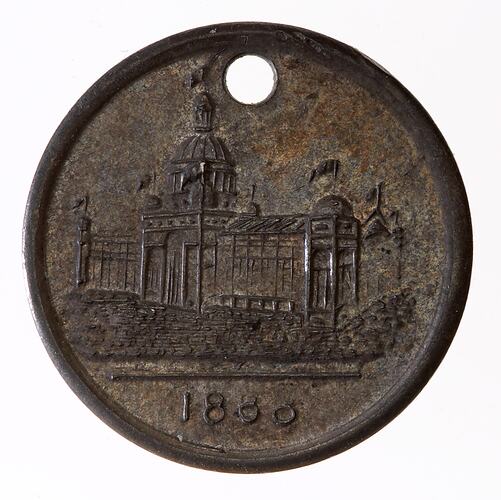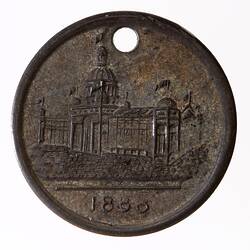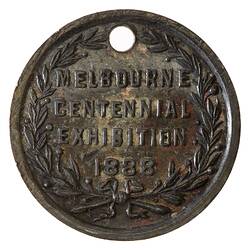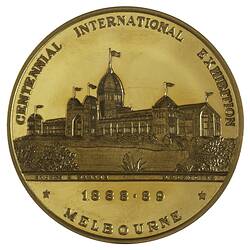Summary
Australia Victoria Melbourne
International Exhibition Commemorative Medal 1888-9 (AD)
Other Details: An silver commemorative medal of the Centennial International Exhibition manufactured to sell to visitors as a memento (probably for adding to charm bracelet) featuring a view of the Exhibition Building as seen from the South East and the name of the exhibition within an olive wreath. The 1888 Centennial International Exhibition, celebrating a century of Australian settlement, surpassed even the grand scale of the1880 Melbourne International Exhibition. It attracted over two million people, but the Victorian government had to spend £250 000 on it, ten times the amount estimated. The exhibition had a distinctively imerial focus, and a greater emphasis on culture than in 1880, particularly on music and painting. A choir of five thousand sang music old and new, and half a million people attended symphony concerts. There were over three thousand paintings on display, including works by artists like J.M.W. Turner and C. Lutyens. The Exhibition Building in Carlton Gardens was lit inside and out by electric lights, claimed to be the largest installation of arc lighting in the world.
Physical Description
An silver medal of the Centennial International Exhibition featuring a view of the Exhibition Building as seen from the South East and the name of the exhibition within an olive wreath.
Obverse Description
View of the Exhibition Building as seen from the South East, in exergue, 1888
Reverse Description
Within an olive wreath, MELBOURNE / CENTENNIAL / EXHIBITION / 1888
Edge Description
Plain
Significance
Exhibitions in Melbourne became a regular occurrence from the middle of the nineteenth century, becoming grander and larger each time. The 1888 Centennial International Exhibition, celebrating a century of Australian settlement, surpassed even the grand scale of the1880 Melbourne International Exhibition. It had more British and imperial resonance. It attracted over two million people, but the Victorian government had to spend £250 000 on it, ten times the amount estimated. The sum seemed absurd after the economic boom came to an end in 1889. There was a greater emphasis on culture than in 1880, particularly on music and painting. A choir of five thousand sang music old and new, and half a million people attended symphony concerts. There were over three thousand paintings on display, including works by artists like J.M.W. Turner, C. Lutyens and Frederic Leighton. The building was lit inside and out by electric lights, claimed to be the largest installation of arc lighting in the world. -REB World Heritage Nomination, Environment Australia, 2002. -D. Tout-Smith 23/10/2003.
More Information
-
Collection Names
-
Collecting Areas
-
Date Issued
1888 AD
-
Issued By
-
Inscriptions
Obverse: 1888 in exergue (last figures poorly struck) Reverse: MELBOURNE / CENTENNIAL / EXHIBITION / 1888
-
Series
-
Material
Silver
-
Axis
12
-
Classification
Medals, Commemorative, Melbourne centennial exhibition 1888-1889
-
Category
-
Discipline
-
Type of item
-
Dimensions
16 mm (Outside Diameter), 1.83 g (Weight)
-
Shape
Round with hole
-
References
Car. 188/20
-
Keywords



